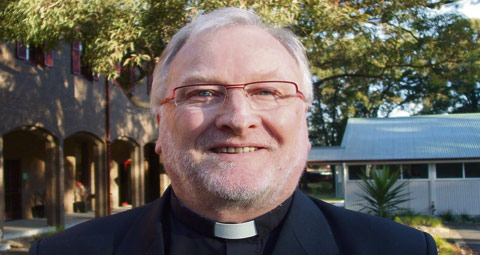BY Ian Dunn | December 3 | ![]() 0 COMMENTS
0 COMMENTS ![]() print
print

The Australian priest with a pro-life mission
A visiting expert warns that, despite being poised to win the battle against the End of Life Assistance Bill in Scotland, UK pro-lifers face losing the war on euthanasia if steps are not taken, IAN DUNN reports
Margo MacDonald’s assisted suicide bill looks set to be rejected by MSPs this week but proponents of euthanasia continue to gain ground in the UK, according to a leading Church expert in the field.
Fr John Fleming, an Australian priest from Adelaide Diocese, is a member of the Pontifical Academy for Life and has devoted much of his ministry to opposing abortion and euthanasia in Australia and around the world.
The married Anglican convert recently visited Scotland during a lecture tour to speak to Catholic clergy about euthanasia in Britain today. In his talk—Voluntary Euthanasia will be the death of me—at the events sponsored by a Society for the Protection of Unborn Children, he explained that the step-by-step approach of the pro-euthanasia movement had led Britain to a situation where euthanasia is essentially already legal.
Pro-euthanasia agenda
Fr Fleming makes a powerful case that the pro-euthanasia movement has vigorously pursued this step-by-step agenda for the last 50 years.
“History of voluntary euthanasia in Britain is a long one,” he said. “The first attempts to legalise it were in the 1930s and they tried again in the 1950s and the key figure behind these attempts was a Lord Chorley.
“Although he failed, what is interesting is that he said his proposed law didn’t go far enough, it only applies to adults it doesn’t apply to children who come into the world deaf, dumb and crippled, but we must go step-by-step and I think that is very significant and important.”
During his talk he drew particular attention to the case of Tony Bland, who was severely injured in the Hillsborough disaster and left in a persistent non-responsive state.
“The doctors and parents wanted to discontinue feeding and medical treatment so that he would die. And they had to bring a case to the courts to have the right to do that. And the court found that the purpose of withdrawing food, fluids and medicine was to end life but this did not authorise euthanasia. This is clearly nonsense.”
Fr Fleming then draws attention to the British Medical Association guidance of 1999, ‘which condones the removal of tube feeding from some non-PVS patients.’
“The BMA claimed that a body of medical opinion had developed on the withdrawal of feeding tubes which meant the courts no longer needed to be consulted on these issues,” he said. “So the Bland court decision, which was meant only to apply in very rare cases, could now be applied much more widely.”
A key next step, he said, was the Mental Capacity Act of 2005, this ‘provides for legally binding directives requesting removal of food and fluids when patients become incompetent’ Fr Fleming explained.
“So the traditional concept of the objective best interests of the patient has now been replaced by a subjective test, [that is] consideration of the previously expressed ‘wishes and feelings’ of the now incompetent patient, even ‘the beliefs and values’ that would be likely to influence his decision if he had the capacity,” he said. “So the doctors are no longer just concerned with preserving life.”
Fr Fleming says that this approach of the pro-euthanasia lobby has taken us to a stage where ‘non dying patients can be refused foods and fluids if in a non responsive state and legally binding advance directives based on autonomy act as a ethical trump on personal values on beliefs. But they won’t stop there.’
Pushing the issue
In countries where euthanasia has been legalised Fr Fleming believes the statistics show the number of cases goes up all the time and the euthanasia lobby pushes for more and more rights all the time.
“In Holland the number of cases of euthanasia has gone up more than ten per cent in each of the last three years and that is not including the assisted suicide cases or the large numbers of patients given opiate overdoses with the explicit intention of hastening death,” he said. “In addition there is a new proposal before the Dutch parliament that a healthy person over the age of 70 can receive a lethal injection if they feel they’ve ‘completed life’ so we can see that the euthanasia lobby have no end to their ambitions.”
In a similar vein, he said that in Belgium in 2003, just one year after the country legalised euthanasia, assisted suicide lawmakers announced plans to extend the law to include those under 18 and all hospitals now face pressure to have a team of euthanasia doctors.
Pro-life issues
In the face of such an overwhelming assault, Fr Fleming believes there are measures Catholics can and must take to protect life.
“The public often do not understand what the courts and politicians are up to and crude opinion polls are used to show support for pro euthanasia positions,” he said. “There needs to be thorough and comprehensive research showing just what the community understands and will tolerate, that sort of research tends to show that when they understand what is going on the public are opposed to it, but that research can and should be done now, because time is urgent.”
After Fr Fleming had finished his talk at Glasgow University’s Turnbull Hall, John Smeaton, SPUC director, and the group’s treasurer Robert Edwards spoke to the assembled clergy about just what their organisation was doing to fight against the push for euthanasia.











